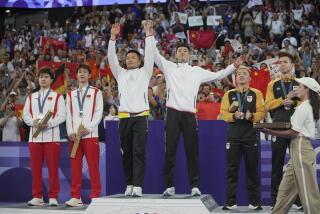LOOKING AHEAD
- Share via
DOHA, QATAR — China’s athletes ruled the Asian Games, accumulating nearly three times as many gold medals as second-place South Korea, in their last major showcase before playing host to the 2008 Beijing Games.
Next comes the real test -- trying to replace the United States atop the Olympic medal standings.
As the Chinese celebrate their 165 golds and 316 overall medals in Doha, coaches are repeating one message to their athletes: Don’t get too confident.
Despite the medal haul, Chinese sports officials say they got only what they expected from the young athletes who will form the core of the team they’re honing for the 2008 Olympics.
“Their achievements impressed me, but the athletes should be aware of the fact that Asian Games are not the same as Olympic Games,” said Duan Shijie, deputy head of the Chinese delegation at the Asian Games.
“In the Olympics, they will be faced with more pressure, stronger opponents and fiercer competition.”
It was a sentiment shared by Liu Xiang, who has become a celebrity in China after winning the men’s 110-meter hurdles at the Athens Olympics in a world record-equaling time.
“China may be the big brother in Asia and hard for other Asian countries to catch, but there are lots of countries that are better at Olympic sports such as swimming,” said Liu, who cruised to a comfortable win at Doha in 13.15 seconds.
China was second to the United States in the medal standings at Athens, with 32 gold medals to 36 for the Americans. Finishing first in 2008 has become almost a national obsession to the Chinese, which is why it surprised some observers that the team for Doha contained so many untested young athletes.
China’s 165 golds in Doha were more than 100 better than South Korea, which finished second with 58 gold medals. Japan was next with 50 golds, though it was second overall in the medals standings with 198 to 193 for South Korea.
China has topped the Asian Games medal chart every time since 1982 and took care to ensure this year was no different, bringing the largest team of 647 athletes.
Of those, almost 64 percent were participating in their first major multi-sport games, part of a strategy of giving greater competition experience to China’s deep pool of talent.
Some officials were critical of the younger athletes, saying their gold medals were what Duan called of “low quality” -- won with results well below the top international level.
Among the top young performers were Zhang Wenxiu, who set an Asian record in the women’s hammer throw; Xue Fei, who won gold on the track in the women’s 5,000 meters; and 16-year-old He Ning, who was the all-around champion in women’s gymnastics. In swimming, Chen Zuo set an Asian record in the men’s 100 freestyle.
China maintained its traditional strength in sports such as table tennis, badminton and diving -- it has not lost a diving final at the Asian Games in three decades -- while also surprising some in field hockey by winning the women’s title and upsetting traditional powers India and Pakistan in the men’s competition.
Struggling against the Chinese dominance, South Korean diver Kwon Kyung-min Kwon summed up the competition: “I don’t think anyone can beat the Chinese at this stage.”
Qi Hui, a triple gold medal-winning swimmer, said the Chinese athletes could not have asked for a better testing ground.
“I don’t dare say whether we’ll be able to replicate this success in 2008, but we will have lots more competition under our belts, and lots more depth, particularly among these young ones that are now just starting to get experience,” Qi said.
“This meet is an excellent way of summing up where we are,” added swimmer Ouyang Kunpeng. “I think we still really need to boost our levels, because 2008 isn’t that far away.”
Chinese officials aren’t likely to reveal what additional measures they may take ahead of 2008. More than most nations, China is highly secretive about its athletic preparations.
Results aside, the concept of giving young athletes a chance to compete has been applauded by Chinese media, who say the country’s notoriously results-obsessed sports officials seem to be taking a longer view.
“In the overall significance of things, the Chinese received a good tempering from their individual performances,” the government’s Xinhua News Agency said in an editorial.
“But of greatest value of all is that the attitude of our sports officials has begun to change,” it added. “Sending young athletes means being able to face defeat, so this attitude and the experience gained far exceed the value of a few gold medals.”
More to Read
Go beyond the scoreboard
Get the latest on L.A.'s teams in the daily Sports Report newsletter.
You may occasionally receive promotional content from the Los Angeles Times.






